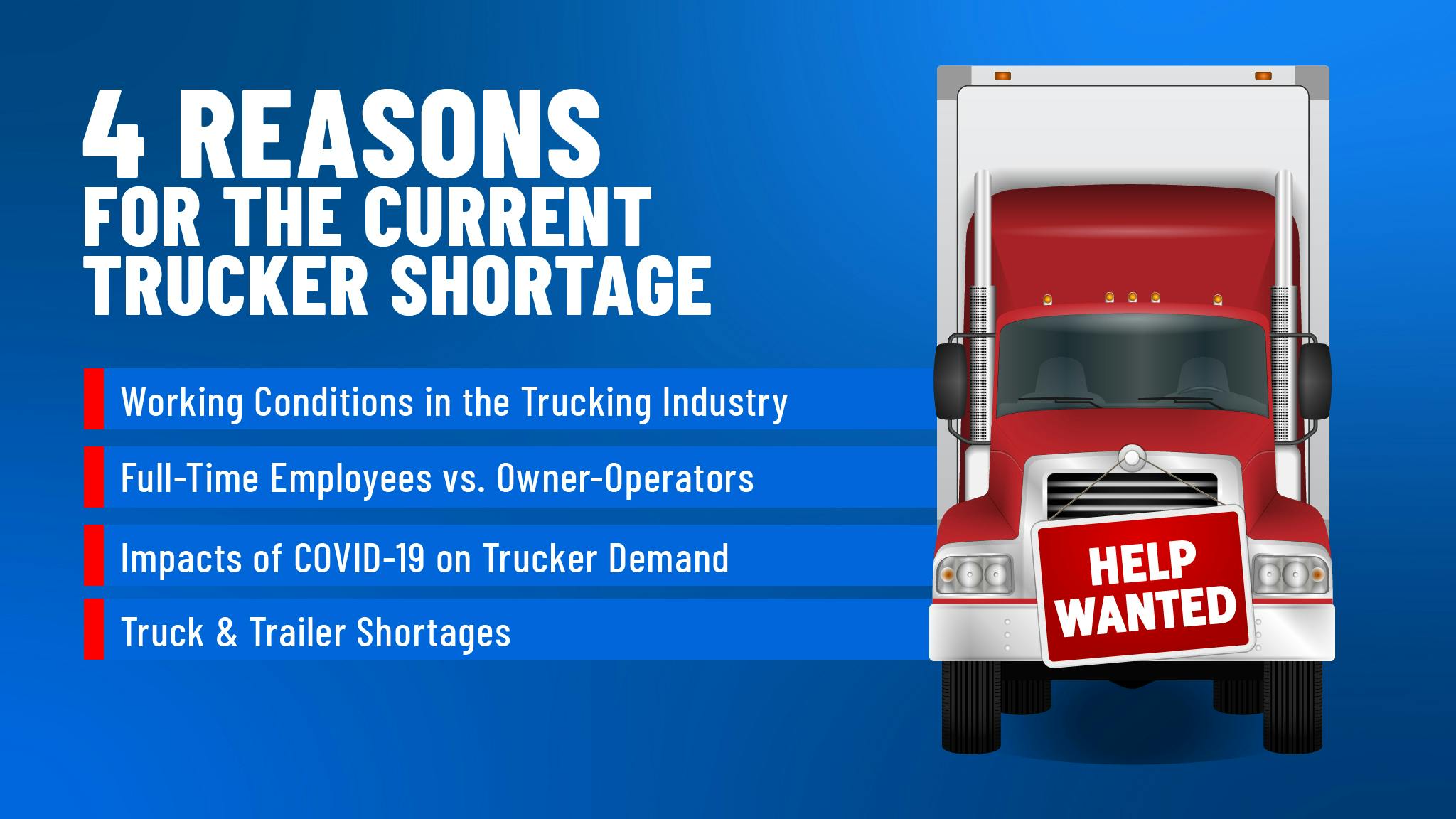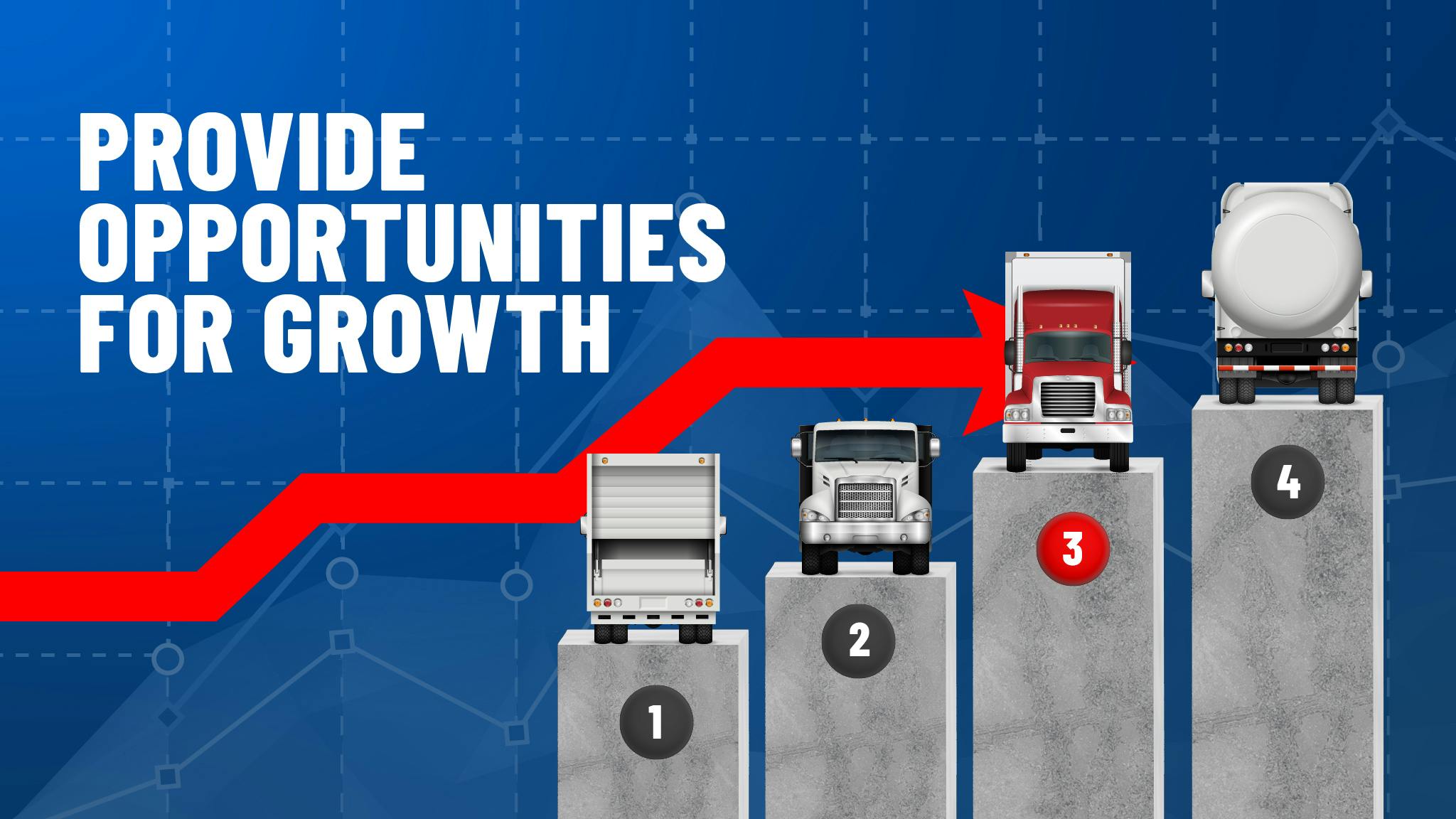Truck Driver Shortage: Everything You Need to Know
February 15th, 2022
Supply chain issues are a topic of many conversations right now. The impact of the pandemic, which led to significant layoffs in early 2020, also created more demand for home delivery. Then, high demand and low supply of truck drivers caused an imbalance within the trucking industry.
But what does a truck driver shortage mean? Here are some of the most significant statistics to give you an idea:
- The trucking industry is short by around 80,000 drivers, a historic number.
- An estimated 37% of drivers were expected to leave due to vaccine mandates.
- The average turnover for long-haul truck drivers has been 90% for years.
For an industry that already experiences demanding work and high turnover, it’s essential to know what’s causing the current lack of truck drivers. Let’s go over the reasons for the shortage and discuss how you can retain your best truck drivers.
4 Reasons for the Current Trucker Shortage
With many experts weighing in on the current truck driver shortage and how that plays into supply chain issues, it’s important to discern fact from fiction. What are the driving factors? Below we’ll look at 4 reasons we currently have a trucker shortage.

1. The History of Working Conditions in the Trucking Industry
Long-haul truckers are often in high demand but driving such long distances is not an easy job. It’s a sedentary position that keeps drivers away from home for extended periods. Drivers can have fatigue issues and fall back on unhealthy habits like smoking or drinking. The average age of a long-haul truck driver is 47, which means many current drivers are nearing retirement age or struggling with the demands of the career and the toll it takes on the body.
There are also safety issues and not just those caused by dangerous road conditions. Truckers hauling hazardous materials can be under even more stress than their professional counterparts.
2. Full-Time Employees vs. Owner-Operators
A lack of well-paying jobs and, for some, the cost of being a trucker also contribute to the truck driver shortage. Not all long-haul truck drivers are company employees. Some truckers are independent owner-operators who earn contracts with logistics companies.
These truckers are classified as independent contractors, which means the drivers must pay for their own certifications, trucks, fuel, and equipment. These truck drivers are paid by the load, and this may not be as lucrative as it seems.
The classification of these truck drivers skews the numbers for employment statistics on the trucker shortage because owner-operators are rarely counted in the same way as permanent employees.
3. Impacts of COVID-19 on Trucker Demand
Of course, we can’t look at the truck driver shortage going into 2022 without mentioning the pandemic. While there may have been issues with truck driver retention, work/life balance, and salaries prior to the global pandemic, many things were exacerbated when COVID-19 forced a shut down in early 2020.
It began with layoffs early on in the pandemic. Shipping companies ground to a halt or closed, and in Canada, numbers showed that nearly 50,000 truck drivers were laid off in the first two quarters of the year.
Then, the industry had a severe case of whiplash when the same pandemic that caused layoffs also increased reliance on shipping and home delivery, requiring it to ramp up quickly.
COVID-19 also created an increased need for safety both on the road and when in contact with others. On top of that, vaccine requirements or regular testing created a barrier for employment.
4. Truck & Trailer Shortages
The pandemic not only caused a shortage of truck drivers but a shortage of trucks and trailers as well. The tremendous increase in demand resulted in a decreased supply. These same problems have impacted shipping containers, too, as thousands are still stranded waiting to unload at ports all around the country.
There are also currently shortages in both parts and labor that are contributing to the truck shortage in 2021. The manufacturing of dry vans is down 25% from where it stood in 2019. There simply aren’t enough semi-trailers available to haul the volume of goods needed.
3 Tips for Keeping Your Best Truck Drivers During a Shortage
Now is the time to get back to basics. Here are 3 tips to improve driver retention and help you take preventative measures to prevent a truck driver shortage in your fleet.
1. Hire for the Future
One of the biggest mistakes employers in any industry make is participating in reactionary hiring. Yes, you need drivers now, but you will need them in the future, too. Focus on sourcing young talent and give them a reason to become long-term employees through a solid salary package, benefits, and a healthy work/life balance.
2. Provide Opportunities for Growth

Talent needs more than just money to stay invested. The incoming generation of employees cites growth opportunities as a significant factor in their career path. When you bring on new talent, offer opportunities for continued education and a potential way to reach new positions within your organization.
3. Invest in Technology and Your Team
The future is now, and if you’re not ready to embrace the next phase of trucking, your competition will. Investing in driver assist and logistics software technology will make your team safer and more efficient. Hand in hand with new technologies is hiring and training a more diverse team of employees willing to learn new tools as they become available.
Support Your Truck Drivers with Quality Equipment from Hale Trailer
Although many things are beyond our control, one area you can control is how you support your truck drivers. It may be some time before the trucking industry reaches equilibrium, but in the meantime, you can work with Hale Trailer to ensure your fleet doesn’t experience a shortage of trucks in 2022.
We carry the widest selection of commercial trailers for sale and commercial trailers for rent. Source quality trucking equipment to improve efficiencies and meet your business demands. Visit one of our locations to learn more about how we can support you and your fleet.
All the information on this website – https://www.haletrailer.com – is published in good faith and for general information purposes only. Hale Trailer Brake and Wheel does not make any warranties about the completeness, reliability and accuracy of this information. Any action you take upon the information you find on this website, is strictly at your own risk. Hale Trailer Brake and Wheel will not be liable for any losses and/or damages in connection with the use of our website.
